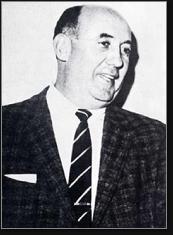
Sport: Basketball
Born: July 21, 1909
Died: January 31, 1983
Town: Paterson, New Jersey
Henry Bodner was born July 21, 1908 in Paterson, NJ. The boy everyone called Hank was obsessed with the fine points of sports—all sports—and was something of a prodigy when it came to analysis and strategy. He attended Passaic High School in the mid-1920s when coach Ernest Blood had his unbeatable “Wonder Team” and actually assisted Blood during games as a player-coach. Hank graduated in 1927 and enrolled at Panzer College (now Montclair State).
Hank was an avid gambler. He used his sharp mind to swing the odds in his favor, but the odds didn’t always pay off. Always in need of money, he often played for professional barnstorming clubs under an assumed name while on the Panzer basketball team. He was not alone in flaunting the amateur rules during the Great Depression, but he was one of the worst offenders. Not coincidentally, it was around this time that the NCAA began to tighten up its amateur eligibility rules.
Hank continued to play professionally for a few years after college, building his reputation as a hoops mastermind. In 1939, he was hired to coach the basketball team at Rutgers University–Newark. Over the next two-plus decades, he used his strategic genius to concoct countless defensive schemes against the big-time programs the Scarlet Raiders faced several times a year. Many of the zone-defense wrinkles that became popular in the 1960s and 1970s traced their beginnings to Hank’s college coaching days.
Clair Bee of LIU and Howard Cann of NYU never liked facing Rutgers–Newark; they knew Hank would have something new and diabolical in store for them. After the Newark boys beat Rutgers (New Brunswick) in 1955, coach Donald White removed Rutgers-Newark from the schedule. Cann once compared games against Hank’s teams to being in an alley fight. Bee watched helplessly one night as Hank’s seven-man squad ended LIU’s four-year homecourt winning streak.
Rutgers–Newark had some of its best seasons in the late-1940s, when Hank actively recruited former semipro players in their 20s who wanted to take advantage of the GI Bill. Hank also coached the school’s baseball team.
While coaching the Scarlet Raiders, Hank’s gambling addiction grew increasingly worse. After being elevated to Athletic Director, he concocted a plan to raise money from wealthy alums for a crew team, but never bought a boat. Eventually, he was let go.
Hank ran a Jewish Community Center in Dallas for many years, overseeing all of its sports programs. After leaving that job, he worked for a dry cleaner in Dallas and was killed in a holdup in the winter of 1983. Two years later, Hank was inducted into the Rutgers-Newark Athletic Hall of Fame.